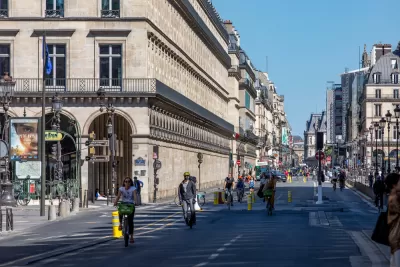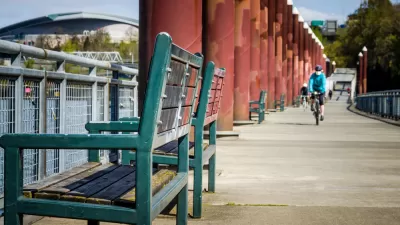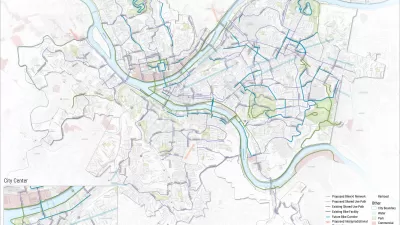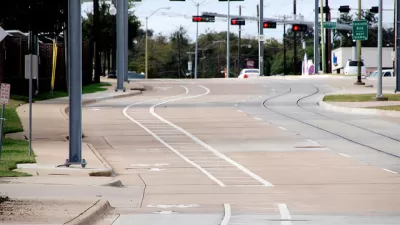New research ties pop up bike lanes implemented in Europe during the pandemic to increased levels of biking.

Veronica Penney shares the news: "Adding bike lanes to urban streets can increase the number of cyclists across an entire city, not just on the streets with new bike lanes, according to a new study."
"The finding adds to a growing body of research indicating that investments in cycling infrastructure can encourage more people to commute by bike," adds Penney.
The study, authored by Sebastian Kraus and Nicolas Koch and published in April by the Proceedings of the National Academy of Sciences of the United States of America, quantifies its findings thusly: "in cities where bike infrastructure was added, cycling had increased up to 48 percent more than in cities that did not add bike lanes."
The effect varies depending on the density of development and public transit. Denser, transit-oriented cities saw larger increases. "Paris, which implemented its bike lane program early and had the largest pop-up bike lane program of any of the cities in the study, had one of the largest increases in riders," according to Penney's explanation fo the study.
The article includes more details on the study's findings, as well as an explanation of the study's methodology. Penney also connects the study' findings to bike mobility as a tool in the effort to reduce greenhouse gas emissions.
While the study focused on Europe, it's worth noting that the city of Bogotá, Colombia, also the originator of Ciclovía, was the first to temporarily expand bike infrastructure in the name of public health during the pandemic, opening 76 km (47 miles) of temporary bike lanes to reduce crowding on public transport in early March. The actions of Bogotá to increase bike infrastructure were one of the clearest, early signs of the many ways the public health responses of the pandemic would interest with issues of planning.
FULL STORY: If You Build It, They Will Bike: Pop-Up Lanes Increased Cycling During Pandemic

Maui's Vacation Rental Debate Turns Ugly
Verbal attacks, misinformation campaigns and fistfights plague a high-stakes debate to convert thousands of vacation rentals into long-term housing.

Planetizen Federal Action Tracker
A weekly monitor of how Trump’s orders and actions are impacting planners and planning in America.

Chicago’s Ghost Rails
Just beneath the surface of the modern city lie the remnants of its expansive early 20th-century streetcar system.

Bend, Oregon Zoning Reforms Prioritize Small-Scale Housing
The city altered its zoning code to allow multi-family housing and eliminated parking mandates citywide.

Amtrak Cutting Jobs, Funding to High-Speed Rail
The agency plans to cut 10 percent of its workforce and has confirmed it will not fund new high-speed rail projects.

LA Denies Basic Services to Unhoused Residents
The city has repeatedly failed to respond to requests for trash pickup at encampment sites, and eliminated a program that provided mobile showers and toilets.
Urban Design for Planners 1: Software Tools
This six-course series explores essential urban design concepts using open source software and equips planners with the tools they need to participate fully in the urban design process.
Planning for Universal Design
Learn the tools for implementing Universal Design in planning regulations.
planning NEXT
Appalachian Highlands Housing Partners
Mpact (founded as Rail~Volution)
City of Camden Redevelopment Agency
City of Astoria
City of Portland
City of Laramie





























